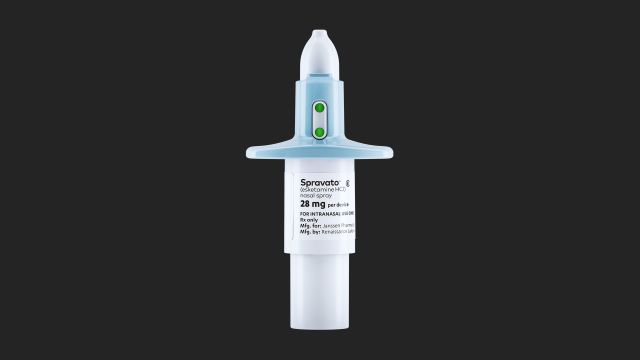Updated on December 13, 2024.
Esketamine is a relatively new depression medication. It’s designed for people with severe, treatment-resistant depression (TRD), a type of major depressive disorder (MDD). To be diagnosed with TRD, a person must have tried at least two antidepressants with little or no success.
Approved by the U.S. Food and Drug Administration (FDA) in 2019, esketamine was arguably the first truly new medication for depression since Prozac and similar drugs became available in the late 1980s. The antidepressants approved after that point had largely been variations of existing drugs.
In many cases, esketamine has been an effective treatment for TRD, even when other drugs haven’t worked. But it’s not right for everyone. Here’s what to know.
What is esketamine?
Esketamine is a type of ketamine, a short-acting pain killer that can cause hallucinations. It’s thought to work by increasing levels of glutamate, a chemical that helps transmit signals between brain cells. Boosting or reestablishing these connections may improve depression symptoms.
Esketamine comes in a fast-acting nasal spray, under the brand name Spravato. Unlike other antidepressants that can take weeks or months to take effect, it often begins to relieve symptoms of depression within a few days. For some people, it may take just hours.
A person can expect to have two esketamine treatments per week, depending on the diagnosis. It’s given together with a conventional antidepressant; esketamine acts as the short-term solution and the other drug, a longer-term solution. It must be given in a clinic, since it can alter perception. You should also not eat for at least two hours before taking esketamine and not drink for at least 30 minutes before using it.
Who is eligible for treatment?
Esketamine is an approved treatment for people with TRD. Adults with depressive symptoms that include acute suicidal ideation or behavior are also eligible.
There are some people who may have problems using esketamine, however. Some, like those with a history of brain bleeds, shouldn’t use it at all. Make sure to talk to a healthcare provider (HCP) if you have any of the following:
- Aneurysmal vascular disease, which causes blood vessels to weaken and bulge
- Arteriovenous malformation, an abnormal connection between the arteries and veins
- Cerebrovascular disease, which affects blood flow to the brain
- Heart disease, heart failure, or a history of a heart attack or high blood pressure
- History of hypertensive encephalopathy, a brain condition caused by high blood pressure
- History of stroke—especially intracerebral hemorrhage, or bleeding in the brain
- Liver disease
- History of drug abuse
- Sensitivities or allergies to drugs like esketamine or ketamine, or other ingredients in the nasal spray
- Other mental illnesses
Pregnant people should not take esketamine since the drug can harm a developing fetus. If you’re planning to become pregnant or you’re breastfeeding, it’s also best to refrain.
Also, make sure to talk to your HCP about any prescription medication, over-the-counter drugs, vitamins, or supplements you may be taking. Some may cause potentially dangerous interactions with esketamine.
What are the side effects of esketamine?
Like all drugs, there are possible side effects to taking esketamine. The most common include:
- Anxiety or nervousness
- Feeling tired or weak
- Confusion
- Feeling calm and relaxed
- Dizziness, lightheadedness, or headache
- Sensations of unreality or detachment
- A sped-up or slowed-down heartbeat
- Blurred vision
- Tingling feelings in the skin
- Diarrhea, nausea, or vomiting
- Loss of taste
Less common side effects include trouble speaking, trouble with urination, nightmares, or feeling drunk. Very rarely, serious side effects like breathing problems, or feeling sad, empty, or experiencing suicidal thoughts occur.
An HCP will usually monitor patients for side effects for at least two hours after they’ve used the nasal spray. If you have them, tell your HCP.
Other side effects may include impaired alertness and coordination. Avoid driving or operating machinery until the day after treatment.
What are the possible treatment barriers?
In addition to the time commitment, the cost of esketamine treatment may be challenging for some patients. A nine-week course of medication can run $10,000 or more out of pocket, though it’s at least partly covered by many insurance programs. The amount of coverage can depend on eligibility, location, and your individual plan. Be sure to check with your provider about costs, whether you have private insurance, Medicare, or Medicaid.
Image credit: Janssen Pharmaceutical Companies of Johnson & Johnson.







